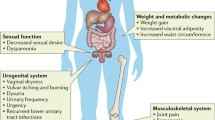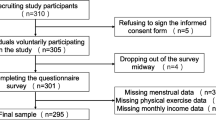Abstract
Objective
To investigate menopause-related symptoms, traditional Chinese Medicine (TCM)-diagnosis and hormone status of two comparable urban samples of menopausal women, one in Essen (Germany) and the other in Shanghai (China).
Methods
Patients suffering from menopause-syndrome were recruited from the TCM-outpatient clinic of the University of Duisburg-Essen in Germany (35 subjects) and from the Shuguang Hospital Affiliated to Shanghai University of Traditional Chinese Medicine in China (35 subjects). The Kupperman-Index for tracing menopausal symptoms was applied. The complete TCM-diagnosis was carried out by the same investigator in China as well as in Germany. Testosterone and estrogen blood samples were collected once from every woman.
Results
There were significant differences in specific symptoms of the Kupperman-Index, such as a higher prevalence of formication and depression in German menopausal women; whereas Chinese menopausal women suffered significantly more from vertigo, headache and paraesthesia symptoms. Concerning TCM-diagnosis, Shen (肾)-yang deficiency was diagnosed in 51.43% of the German women in contrast to 5.71 % of the Chinese women; 17.14 % of the German women were diagnosed as having Shen-yin deficiency compared to 74.29 % of the Chinese women. The German women showed significantly lower mean hormone levels for testosterone compared to the Chinese women (P⩽0.0005).
Conclusions
German and Chinese menopausal women do not show different prevalence but have different patterns of menopausal symptoms. Furthermore, from a TCM point of view, German women suffer more from Shen-yang deficiency whereas Chinese women suffer more from Shen-yin deficiency syndrome. These results are supported by significantly lower levels of testosterone in German women compared to Chinese women, which, in TCM, is a characteristic of yang deficiency.
Similar content being viewed by others
References
Schmidt-Golwitzer K. Women’s Health Care: Trends der naechsten Dekade. Arch Gynaekol Obstet 1999;263(Supp 2):577–583.
Teschner A, Hinrichsen M. Klimakterium. In: Stauber M, Weyerstahl T. Gynäkologie und Geburtshilfe. Stuttgart: Thieme, 2005:133–136.
Eichling PS, Sahni J. Menopause related sleep disorders. J Clin Sleep Med 2005;1:291–300.
Rapkin AJ. Vasomotor symptoms in menopause: physiologic condition and central nervous system approaches to treatment. Am J Obstet Gynecol 2007;196:97–106.
Chim H, Tan BH, Ang CC, et al. The prevalence of menopausal symptoms in a community in Singapore. Maturitas 2002;41:275–282.
Shea JL. Chinese women’s symptoms: relation to menopause, age and related attitudes. Climacteric 2006;9:30–39.
Lasley BL, Santoro N, Randolf JF, et al. The relationship of circulating dehydroepiandrosterone, testosterone, and estradiol to stages of the menopausal transition and ethnicity. J Clin Endocrinol Metab 2002;87:3760–3767.
Kwee SH, Tan HH, Marsman A, et al. The effect of Chinese herbal medicines (CHM) on menopausal symptoms compared to hormone replacement therapy (HRT) and placebo. Maturitas 2007;58:83–90.
Randolph JF, Sowers M, Gold EB, et al. Reproductive hormones in the early menopausal transition: relationship to ethnicity, body size, and menopausal status. J Clin Endocrinol Metab 2003;88:1516–1522.
Langevin HM, Badger GJ, Povolny BK, et al. Yin scores and yang scores: A new method for quantitative diagnostic evaluation in traditional Chinese medicine research. J Altern Complement Med 2004;10:389–395
Author information
Authors and Affiliations
Corresponding author
Additional information
Supported by the German Academic Exchange Service (Deutscher Akademischer Austauschdienst, DAAD, No. A/06/00013)
Rights and permissions
About this article
Cite this article
Rampp, T., Tan, L., Zhang, L. et al. Menopause in German and Chinese women—An analysis of symptoms, TCM-diagnosis and hormone status. Chin. J. Integr. Med. 14, 194–196 (2008). https://doi.org/10.1007/s11655-008-0194-1
Received:
Published:
Issue Date:
DOI: https://doi.org/10.1007/s11655-008-0194-1




